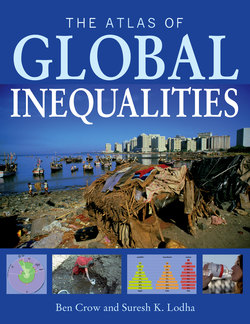Читать книгу The Atlas of Global Inequalities - Ben Crow - Страница 33
На сайте Литреса книга снята с продажи.
Оглавлениеsignificant in developing countries, where economic output is lower and tax systems are less extensive. Industrial development and a history of collective organization make fiscal redistribution more likely to be acceptable and effective. In the 1950s and 1960s, many developing countries undertook land reforms to equalize agrarian opportunities, and to increase economic growth. Some reforms, notably in East Asia, established significant rural equity. Innovative forms of action on inequality that have had some success in reducing poverty include cash transfers conditional upon children going to school. However, the way such policies are implemented, and lack of support at all levels of the economic and political order, may undo or reverse their effects.
In response to popular pressure, governments may attempt to reduce inequality through minimum wage laws, progressive taxation, and land reforms.
33
Copyright © Myriad Editions
